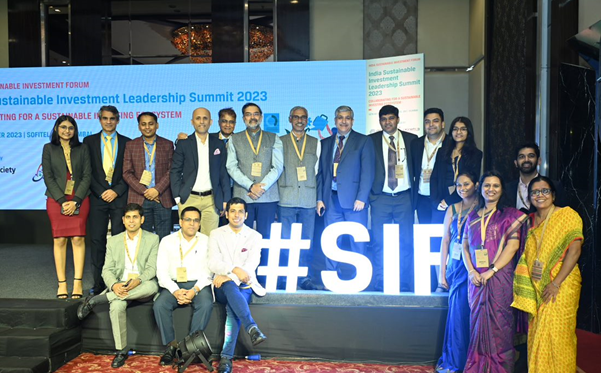- January 29, 2024
- Posted by: CFA Society India
- Category:Events

Contributed by
Bharti Krishnan, CFA
Partner, FineTrain

ISIL Summit was conceptualised a year ago, during a meeting between CFA Society India volunteers and Upendra Bhatt from cKinetics to bring together various participants in the sustainable investment industry.
In the runup to the event, volunteers met every saturday, for over 3 months, driven by multiple reminders from Mohan, our chief volunteer and Annlin, head of execution. The agenda setting and speaker finalisation took almost 4 meetings as we wanted representation from all stakeholders, including asset managers, regulators & policy think tanks.
It was exciting to see various members of sustainable investment ecosystem converge for the event. We had a packed day with 7 sessions! Highlights from each of the sessions are as under:
Session 1- The challenge of transitioning to a sustainable future
Keynote speakers: Sh. Suresh Prabhu, former Union Minister, and Navneet Munot, CFA, MD & CEO of HDFC AMC. Key messages:
- We need to look at a bouquet of energy options including reducing the carbon footprints of our existing energy sources
- Investment will always chase returns, so we need to make investing in energy assets rewarding for investors, developing carbon markets will play a role in attracting capital
- Sustainability is ingrained in the nation’s ethos, fostering a natural alignment with environmentally conscious practices, India has the opportunity to lead the world in the energy transition over the next 30-40 years
- We need vital synergy between politics, finance, and science to drive sustainable initiatives. Political outlook and willingness to spend on societal awareness about climate change is critical, we need multilateral institutions to underwrite investments in climate projects.
The plenary session also presented two reports, one on ‘Sustainable Investment in India’ and the other on ‘Climate Action by India Inc.
Session 2- Current state of sustainable investing in India
Speakers: Pawan Mehra from cKinetics, Aniket Shah from Jefferies, Akhilesh Tilotia from National Investment and Infrastructure Fund (NIIF), Jay Kothari from DSP AMC and Nana Li from Impax Asset Management, Hong Kong.
Pawan shared the “Sustainable Investment in India” report and discussed its findings with panel members. Key highlights were as under-
- ESG fund managers can raise capital from global markets, as global investors are increasingly interested in ESG compliant assets. However, raising capital from ESG oriented investors in not cheaper vis a vis other forms of capital
- Sustainable investing means we are investing in sustainability sector, not to be confused with sustainability of investing which indicates that return on the capital should be more than the cost of the capital
- Among various ESG investing practices, exclusionary strategy (to avoid stocks of certain companies) is not practical especially in the context of carbon emitting sectors because such sectors play a key role in the economy. Instead of excluding such companies, one can make decisions based on the progress in their net zero transition plans.
- Investing in ESG compliant assets takes time to bring returns, private market can afford to be more patient because they have a longer-term horizon, they don’t have to mark to market their investment on a daily basis
Session 3– Enhancing the reliability of ESG Information in ESG Integration –
Speakers: Priyanka Dhingra from SBI Mutual Fund, Harsha Upadhaya from Kotak Mutual Fund and Miren Lodha from Crisil Ratings. The speakers highlighted the following:
With the launch of the Business Responsibility and Sustainability Report ( BRSR) framework, ESG data has become available for the top 1000 companies, marking significant progress from a few years ago when such data was entirely unavailable. However, the data lacks standardization, as companies within the same sector report different parameters. For instance, FMCG companies that outsource a substantial portion of their manufacturing report data on only their internal operations. To decipher this data effectively, we require a team of analysts.
- To compensate for the lack of consistent data, it is essential to gather information from various sources beyond the BRSR filing. These sources may include other regulatory filings of the company, its website, and industry associations. SEBI’s rules on assurance or audit of BRSR data is a positive step for the industry, promising an enhancement in data quality. Nevertheless, the industry is still in its early stages, and the improvement in data quality will occur gradually.
- Local ESG frameworks such BRSR will co-exist along with international frameworks such as GRI. Over time, these frameworks will become interoperable, allowing someone reporting in BRSR to seamlessly report in other frameworks as well.
Session 4- How can regulators encourage sustainability through financial markets
Speakers: Shamit Chokshi, CFA from ICICI Prudential Fund, Josina Kamerling from CFA Institute and Santosh Janakiram from Cyril Amarchand Mangaldas. Speakers highlighted the following:
- Indian issuers find it easier to access global market for ESG or green issuances, given the current superior recognition of global certifications/standards, and a higher global demand for ESG products.
- ESG regulations need to be robust and consistent while mitigating the cost of compliance to ensure the nascent ESG fund management market in the country can
- As ESG regulations evolve globally, Europe, positioned at the forefront of developing ESG regulations, provides valuable case studies on the development of ESG taxonomy and reporting standards.
Session 5- Climate Risk Integration Guidance Framework
Speaker: Ankur Gupta, CFA from Northern Asset Management Trust, Upendra Bhatt from cKinetics, Dhruba Purkayastha from Climate Policy Initiative and Maria Lombardo from Standard Chartered Bank
The speakers emphasized the complexity of assessing climate risk, highlighting significant uncertainty stemming from both physical risk and the climate related policies and regulations. Asset managers are actively seeking climate models to evaluate the impact of these risks on equity and credit portfolio values, and returns.
While utilizing past data on carbon emissions and events is crucial for forecasting, forward-looking indicators are equally essential.
Session 6: Understanding the sustainable investment market in India
Speakers: Srini Viswanathan from Vibrant energy, Chirag Mehta from Quantum Asset Management Company and Abhishek Loonker, CFA from GEF partners. Key message was-
- Sustainable invests encompass a whole gamut of sectors including renewable, agriculture, waste, mobility, circular economy. All this sectors are poised to grow significantly in the next 30-40 years. Energy is the biggest piece as 70% of the world’s emissions come from fossil fuels
- There was a surge in capital flowing into ESG mutual funds in 2021. However, there has been a subsequent decline globally due to concerns about greenwashing. In India, ESG-based mutual funds currently constitute less than 1% of total assets under management, and this figure has been stagnant at over $2 billion.
- India needs $3 trillion to meet its climate commitments. Foreign investors are interested in the Indian equity market and could potentially invest in public-listed ESG-compliant companies or mutual funds. However, the speakers highlighted the importance of having a comprehensive taxonomy that defines what is considered “green.” This taxonomy should align with global standards rather than being based solely on local standards to attract international investments.
Session 7 : Role of SIFs in promoting the sustainable investing landscape
Speakers: Mohan Kumar Prabhu, CFA from Aon Consulting and James Alexander, CEO UK (SIF). Key message was –
SIFs are platforms that bring together various stakeholders in the sustainable investing ecosystem, including asset owners, asset managers, and other relevant members. In the case of the UK SIF, it has over 320 members, representing a diverse range of entities such as banks, asset managers, law firms, research firms, and NGOs. UK SIF is actively involved in influencing and contributing to the development of policies related to sustainable investments.
SIFs can play a crucial role in building trust in sustainability assets. They have the potential to reduce greenwashing, enhance trust in sustainable investments and, increase the capital available for sustainable finance.
The event ended with the closing remarks from Ravi Gautham, CFA from Northern Asset Management Trust.
ISIL is going to be an annual event and I am already looking forward to its next edition!

